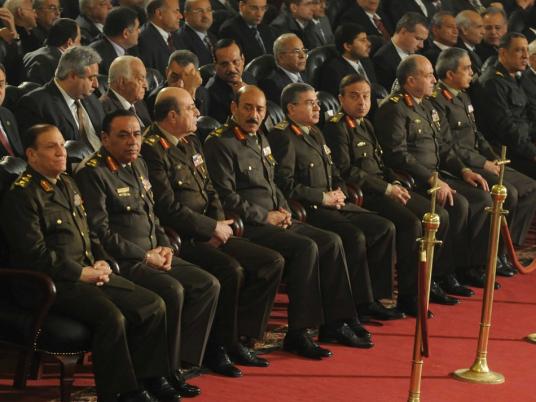
Egypt’s ruling generals in recent days have issued a wave of promises to the country’s protestors, dissidents and victims of political unrest in what seems to be an attempt to cool revolutionary fervor before the anniversary of the start of the revolution on 25 January.
But activists say these gains, though real, are not likely to lessen popular pressure leading up to Wednesday, which will mark the one-year anniversary of the 18-day unrest that led to the ouster of former President Hosni Mubarak.
Rather, many say that the most recent concessions constitute another example of the military council’s long-term policy of making incremental changes only under the threat of mass protests.
The Supreme Council of the Armed Forces (SCAF) has promised to release blogger Maikel Nabil and nearly 2,000 other prisoners subjected to military trials, in addition to giving jobs to those wounded in clashes.
“It’s a gesture, it’s a plea; it’s not an indication of the long term” said Shahira Aboueleil, an activist with the No to Military Trials for Civilians group, which has campaigned for the release of Nabil and thousands of other civilians arrested in the past year, many of whom were sentenced to years in prison by military courts.
“We’re very happy, we’re ecstatic for the prisoners’ families, but we also want a very clear position from the army that it will officially end military trials,” she said.
The military has said that Nabil and the 1,955 other prisoners will be released on 26 January, presumably so that their presence cannot lend strength to any anti-SCAF protests that might take place on the anniversary.
Nabil, 26, was arrested for writing on his blog that the military was not looking after the best interests of Egyptians. He received a two-year prison sentence in December on charges of insulting the armed forces, publishing false news and disturbing public security.
The military council has repeatedly attempted to portray itself as the protector of Egyptian people and the protest movement that began last January.
“This generation, as will future generations, remembers with pride and gratitude the sacrifices of the best of Egypt’s youth, who faced brutal repression and who sacrificed their very blood in order that every yard and square of Egypt might have freedom and dignity,” said a statement posted on the SCAF’s official Facebook page.
Generals have also planned a celebration that will take place in a stadium outside Cairo’s downtown, far from Tahrir Square, during which time military leaders who were part some of the largest clashes during the 18-day uprising will be awarded medals alongside victims and family members.
“I wonder how they are going to give the alleged perpetrators medals, while at the same time giving them to the victims,” said Ziad Tawab, deputy director of the Cairo Institute for Human Rights Studies. “This is one funny irony,” he said.
As for the promise of jobs for victims wounded in clashes with armed forces and police, Tawab remains skeptical. He wants to know where the wounded will work. Earlier this year, the government also promised pensions to victims and their families, but that pledge has yet to be fulfilled.
“What is the promise, and what is the reality?” said Tawab. “We’ve heard so many promises from the SCAF, but I haven’t seen many implemented.”
The SCAF’s concessions are an example of how consistent public pressure can bring about improvements in human rights, according to Heba Morayef, Cairo-based researcher for Human Rights Watch.
“This is not evidence of any political goodwill on the part of the military,” she said. “I think the pardon of Maikel Nabil comes as a direct result of the work of the No Military Trials campaign. I think it’s a reflection that public pressure still works.”
Now the campaign is trying to find out who of the 12,000 arrested and tried in military courts is about to be released, because the SCAF did not issue a list of names. It’s a daunting research task, Aboueleil said. They are also going to start campaigning for the recoupment of monetary damages sustained by prisoners who were locked up for a year.
“Though a lot of these people have been exonerated, they’ve spent a year in prison. They should be compensated for that year,” she said.
Aboueleil said that the No Military Trials group will be participating in protests on 25 January to demand an end to military trials and the release of prisoners, as well as a transfer of power to a civilian government.
Other activists confirmed their intentions to participate in protests planned for Wednesday.
“I’m not sure even what concessions could calm public anger. It’s about the accumulation of incident after incident of violence,” said Morayef. “For those that want to come out and protest, these partial concessions are not going to be enough.”
Correction: This article previously stated an incorrect number of prisoners.




